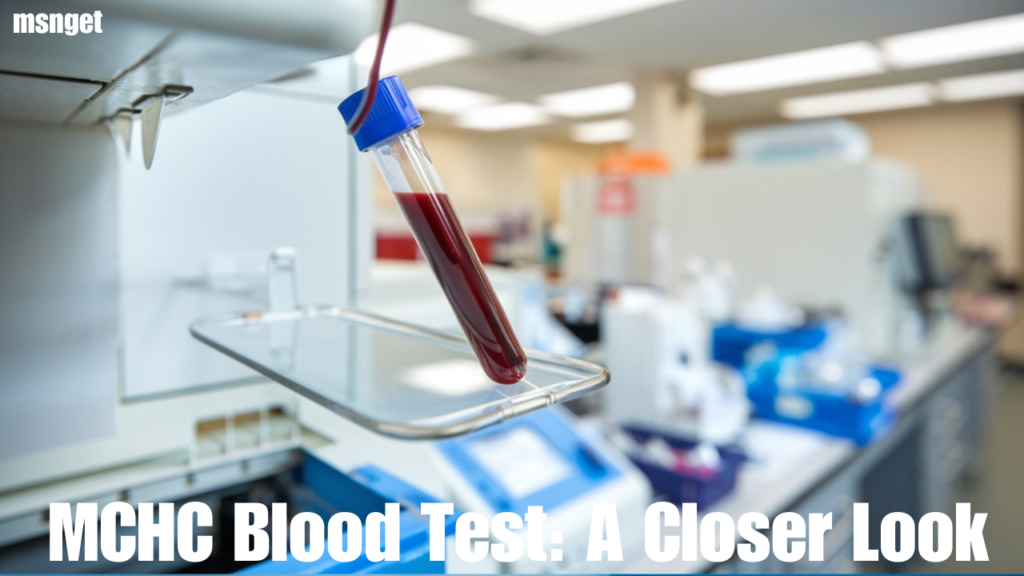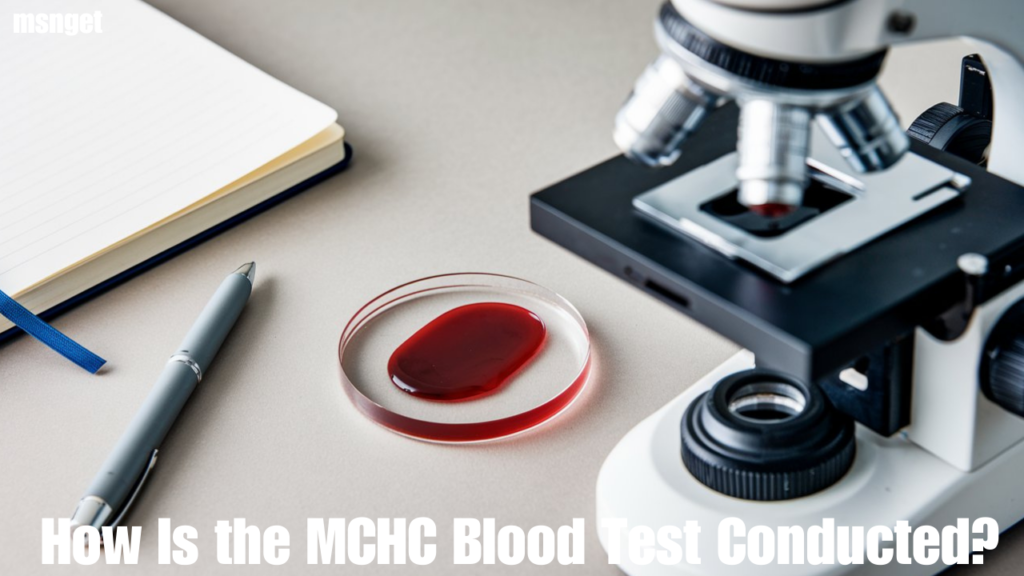

MCHC Blood Test
MCHC blood test is an essential diagnostic tool that evaluates hemoglobin concentration in red blood cells. Hemoglobin, a protein in red blood cells, is vital in oxygen transport from the lungs to various body parts. Analyzing the MCHC level can offer insights into different blood disorders and help medical professionals make informed treatment decisions. Here, we’ll explore the MCHC blood test in-depth, understanding its importance, procedure, interpretation, and implications for overall health.
What Is MCHC?
MCHC, or Mean Corpuscular Hemoglobin Concentration, measures the average hemoglobin concentration in a given volume of red blood cells. This metric is crucial in assessing the oxygen-carrying capacity of blood, which is essential for sustaining the body’s cells and tissues. The MCHC blood test provides insight into how densely hemoglobin is packed into each red blood cell, helping identify potential abnormalities in blood health.
MCHC Blood Test: A Closer Look
MCHC stands for Mean Corpuscular Hemoglobin Concentration. It’s a blood test that measures the average amount of hemoglobin in a given volume of red blood cells. Hemoglobin is the protein in red blood cells that carries oxygen throughout the body.

Why is MCHC Measured?
MCHC is one of several tests to assess overall red blood cell health. It can help diagnose various blood disorders, including:
- Iron deficiency anemia: Low MCHC often indicates a lack of iron necessary for hemoglobin production.
- Hemolytic anemia: In this condition, red blood cells are destroyed faster than they can be replaced, decreasing MCHC.
- Thalassemia: A group of inherited blood disorders that affect the production of hemoglobin.
How is the MCHC Test Performed?
The MCHC test is typically part of a complete blood count (CBC), a routine blood test that measures various components of your blood, including red blood cells, white blood cells, and platelets.

Why Is the MCHC Blood Test Important?
The MCHC blood test is part of a broader panel called a Complete Blood Count (CBC). This test is routinely ordered during regular check-ups and is critical in diagnosing various conditions, especially anemia and other blood disorders. Here’s why the MCHC test is crucial:
Also Read: UGG: Cozy Footwear That Redefined Comfort and Style
- Detecting Anemia: MCHC levels can indicate types of anemia, such as iron deficiency or hemolytic anemia. Low MCHC levels typically indicate insufficient hemoglobin production, which may signal iron deficiency or a related issue.
- Assessing Hemoglobin Health: Hemoglobin abnormalities, such as thalassemia, affect the MCHC, making it a valuable measure for conditions affecting hemoglobin synthesis and quality.
- Supporting Diagnosis of Other Conditions: Besides anemia, the MCHC blood test can help detect more complex conditions, like spherocytosis, where the red blood cells are abnormally shaped, affecting their functionality and life span.

How Is the MCHC Blood Test Conducted?
The MCHC blood test procedure is straightforward. Typically, it involves the following steps:
- Blood Sample Collection: A healthcare provider will draw a blood sample from a vein in your arm. This process is minimally invasive and usually takes just a few minutes.
- Laboratory Analysis: The blood sample is then sent to a laboratory, where it undergoes analysis to measure various parameters, including MCHC, within the Complete Blood Count (CBC).
- Result Interpretation: The lab results provide detailed information about red and white blood cells, hemoglobin levels, and MCHC, among other metrics.

MCHC Results
The interpretation of MCHC blood test results requires a healthcare professional who will analyze them in the context of your overall health and other blood test results. Here’s a look at what different MCHC levels might indicate:
High MCHC Levels
A high MCHC level suggests that the hemoglobin concentration in red blood cells is above average. This result may be associated with a condition called spherocytosis. In spherocytosis, red blood cells are spherical rather than the typical disc shape, which impacts their ability to move smoothly through blood vessels and reduces their overall functionality. High MCHC can also occasionally be linked to other forms of hemolytic anemia, where red blood cells are destroyed at an accelerated rate.

Low MCHC Levels
A low MCHC level often points to iron deficiency anemia. In this condition, the body lacks sufficient iron to produce hemoglobin effectively, leading to a lower hemoglobin concentration in red blood cells. Low MCHC may also be associated with conditions like thalassemia, a genetic disorder that affects hemoglobin production.
When Should You Get an MCHC Blood Test?
If you experience symptoms such as fatigue, shortness of breath, pale skin, or a general feeling of weakness, your healthcare provider may recommend an MCHC blood test as part of a CBC. These symptoms are often associated with low hemoglobin levels and potential anemia, making MCHC a helpful metric in understanding your blood health.
Routine check-ups may include an MCHC blood test to ensure your red blood cells function optimally. Early detection of issues through MCHC levels can facilitate timely intervention and treatment, helping to prevent complications.

Factors Affecting MCHC Levels
Various factors can influence MCHC levels, and understanding these can provide better insight into one’s health status:
- Iron Intake: Since hemoglobin production relies on adequate iron, a diet low in iron can lead to low MCHC levels. Ensuring sufficient iron intake through diet or supplements may positively impact MCHC.
- Vitamin B12 and Folate Levels: Both vitamin B12 and folate are essential for red blood cell production. Deficiencies in these nutrients may affect hemoglobin levels, potentially influencing MCHC.
- Chronic Illnesses: Some chronic illnesses can influence red blood cell production and shape, impacting MCHC. Conditions such as kidney disease, autoimmune disorders, and certain cancers are often associated with altered MCHC results.
- Genetics: Inherited disorders, like thalassemia, affect hemoglobin production and can result in low MCHC. Knowing your family’s medical history can help interpret MCHC results.

How Can You Maintain Healthy MCHC Levels?
Maintaining optimal MCHC levels is primarily connected to good nutrition and overall wellness. Here are a few tips to help keep your MCHC levels within a healthy range:
- Balanced Diet: A diet rich in iron, vitamin B12, and folate can support healthy hemoglobin production. Include leafy greens, beans, lean meats, and whole grains.
- Regular Check-Ups: Routine blood tests can help monitor your MCHC levels and allow early detection of any issues.
- Staying Hydrated: Proper hydration is essential for overall blood health, as it supports red blood cell function and helps maintain the balance of bodily fluids.
- Avoiding Alcohol and Tobacco: Excessive alcohol and tobacco use can negatively impact red blood cell production and lead to deficiencies that may alter MCHC levels.
Common Questions About MCHC Blood Test
What should you do if your MCHC is too high or too low?
Consult your healthcare provider if your MCHC levels are outside the normal range. They may recommend lifestyle changes, dietary adjustments, or additional testing to identify underlying causes. Treatment plans vary based on the specific diagnosis.
Can a single MCHC result indicate a health issue?
MCHC levels are most meaningful when interpreted alongside other blood test results. A single abnormal result does not necessarily confirm a diagnosis but may indicate the need for further testing.
Is there a way to increase MCHC naturally?
Eating iron-rich foods, ensuring adequate vitamin B12 and folate intake, and following a balanced diet can help improve MCHC levels over time. However, consult a healthcare provider before making dietary changes, especially if you suspect an underlying condition.
Conclusion
The MCHC blood test is a valuable diagnostic tool that provides essential insights into hemoglobin concentration and red blood cell health. By understanding MCHC levels, healthcare providers can diagnose and monitor various blood disorders, from iron deficiency anemia to inherited conditions like thalassemia. Monitoring and maintaining healthy MCHC levels can support your overall well-being, ensuring your body receives the oxygen it needs to function at its best.
Whether for routine health monitoring or addressing specific symptoms, the MCHC blood test plays a crucial role in modern diagnostics, offering patients and doctors a window into the vital world of blood health.
A healthcare provider will draw a blood sample from a vein in your arm to perform the test.
Interpreting MCHC Results
Your healthcare provider will interpret your MCHC results with other blood test results.
- High MCHC: A high MCHC may indicate spherocytosis, in which red blood cells are abnormally shaped.
- Low MCHC: A low MCHC often suggests iron deficiency anemia.
It’s important to note that a single blood test result only sometimes provides a complete picture. Your healthcare provider may order additional tests or recommend follow-up care to diagnose underlying conditions.














